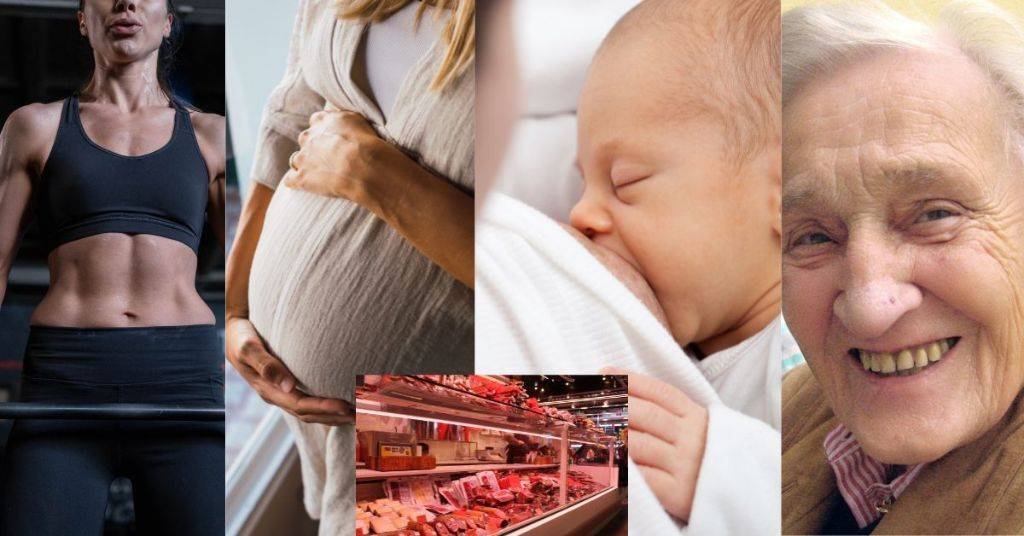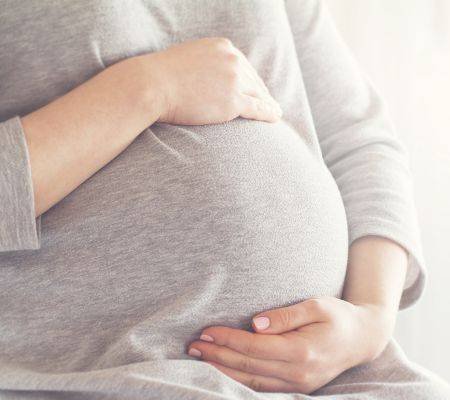
Table of Contents
The average American woman with a body weight of 77.47kg or 170.8lbs will need a minimum of 62g of protein for her bodily functions that require proteins. Depending on the level of physical activity she will also need a range of 77 to 123g of protein daily for muscle gain but with a maximum limit of 271g per day.
The principle used to obtain the above figures is something that also applies to men. However, additional factors influence the daily amount of proteins a woman should have such as pregnancy and lactation.
I will discuss how much protein women need based on the different factors that determine or influence it. More light will be thrown on the amount of protein you will need as a woman to gain or lose weight plus the protein needs of elderly women.
How many grams of protein do women need a day?
Your weight and daily calorie needs are two of the best data used to determine your daily protein needs as a woman. There are also a couple of other factors that influence your daily protein requirement. I’ll highlight some of those below.
Based on body weight.
Concerning your weight, you will need a minimum of 0.8g of protein per kilogram of your body weight daily. This is the amount needed to keep you from falling sick or suffering protein deficiency and it translates to 56g of protein for a woman weighing 70kg.
This recommended daily allowance of 0.8g/kg/day is the amount you will need to maintain bodily functions such as making antibodies, blood, enzymes, connective tissues that hold your body together, and even your hair as outlined by the Harvard School of Medicine. Your actual daily protein requirement should be higher than this minimum figure is determined by your age, and activity level, among other factors.
No matter how the factors outlined above apply to you, there is a limit to how much protein you should take daily. You are not advised to go beyond 3.5g of protein per kilogram of your body weight a day. If you weigh 70kg your maximum daily protein intake should be 245g.
You will find a table showing your daily protein need as a woman according to body weight in another article titled Daily Intake for Protein.
Kindly keep in touch by signing up for our newsletter:
Based on daily calorie requirement.
Irrespective of gender, it is recommended that 10% of your total daily calorie need should come from proteins. If as a woman you require 2000 calories per day, this will amount to 200 calories from protein. 200 calories represents 50g of protein.
The above figure is the minimum amount of protein you will need each day. That said, there is a maximum amount you mustn’t exceed. The recommended upper limit is 35% of your daily calorie requirement. In other words, 35% of your daily total calorie requirement should come from protein.
It represents about 700 calories from protein each day. To get to 700 calories you will require 175g of protein. So for a woman with a daily energy requirement of 2000 calories, you should not consume above 175g of protein a day. Your actual daily protein requirement, when considered in the light of other factors, will be way less than 175g.
Based on the level of physical activity.
Physical activity is one of the strongest determinants of your daily calorie need and by extension, your daily protein requirement. The more active you are the more calories you will need to get through your daily activities.
10% of a higher daily calorie need resulting from an active life will be considerably higher than that of a lower daily calorie need for someone not so active. For instance, if as an active woman, you require a daily intake of 2500 calories, 10% of that is 250 calories. Therefore you will need 250 calories to come from protein which represents 62.5g of protein.
In the section above you read how a woman with a daily calorie need of 2000 calories will require a minimum of 50g of protein daily. A more active woman requiring 2500 calories daily will need a minimum of 62.5g of protein. Therefore, as a more active woman in need of 2500 calories daily, you will require an extra 12.5g of protein than a less active lady who requires 2000 calories in a day.
Based on body build.
Part of the use of dietary protein is the maintenance of the muscles in your body. More muscular people will require more amounts of protein daily for this maintenance. The more muscles there are to be maintained, the more proteins you will require to maintain them and that’s simple enough.
So if you are the skinny type you will require less daily protein intake than a more muscular woman who is of the same weight, and level of activity. If you desire to build muscles, you must boost your daily protein intake. You will need more to build more and need to maintain a higher daily protein intake to keep those extra muscles.
Based on health status.
You’ll require more protein when sick to combat inflammation and help with healing, repair, and recovery than when you are healthy. This is in addition to what you’ll need for muscle maintenance and other physiological functions like the making of enzymes and antibodies.
So, between women of equal weight and activity level, the sick, injured, and those suffering from chronic diseases will require additional protein for healing and recovery. However, there may be a reduction in the daily protein need for those suffering from Kidney or liver diseases.
Based on pregnancy and lactation.

Just as when your body requires more daily protein intake as a result of illness, pregnancy, and lactation are two other physiological processes that demand additional daily protein consumption.
A pregnant or lactating mother will require more daily protein than her contemporaries of the same active level and weight as her. I usually specify the conditions under which things are possible. That a woman is pregnant yet very inactive may not necessarily mean her protein demand will be higher than another woman of greater weight, and musculature, and who actively exercises or is into sports.
For a pregnant woman, about 75 to 100g of protein is needed daily for the fetus, enlarging placenta, breasts, and blood supply according to the Harvard School of Medicine.
The recommended dietary allowance for protein in the first trimester of pregnancy is about the same for non-pregnant mothers. This increases afterward and a small number of women don’t meet their protein requirement in the second and third trimesters according to research published in the National Library of Medicine.
Below are the recommended dietary allowance (RDA) of protein during pregnancy:
- 1st trimester: 0.8g/kg bw/day
- 2nd trimester: 1.1g/kg bw/day
- 3rd trimester: 1.1g/kg bw/day.1
How much protein per day to lose weight for a woman?
Research published in the European Journal of Sports Science found that consuming 1.8 to 2.7g of protein per kilogram of body weight per day along with a moderate energy deficit of -500cal and resisted exercises leads to the loss of free fat mass (FFM).2
The loss of free fat mass represents a drop in body weight. The amount of protein needed is tied to your body weight. The higher your weight, the more protein you will need for weight loss. Below is a table showing the amount of protein you will need for weight loss according to your body weight.
| Body weight | Amount of protein needed for weight loss |
|---|---|
| 50kg | 90 to 135g |
| 60kg | 108 to 162g |
| 70kg | 126 to 189g |
| 80kg | 144 to 216g |
| 90kg | 162 to 243g |
| 100kg | 180 to 270g |
| 110kg | 198 to 297g |
There are clear physiological mechanisms by which high protein intake enables weight loss. The various ways by which proteins help with weight loss were discussed in another article you may want to read.
How much protein should a woman eat to gain muscle?

The amount of protein you need daily to build muscles depends on how active or inactive you are as a woman or man. The more active you are, the more proteins you will need. The least amount of protein required daily per kilogram of body weight to build muscles from a minimally active to an intensely active woman is:
- Minimally active: 1g/kg/day.
- Moderately active: 1.3g/kg/day.
- Intensely active: 1.6g/kg/day.
From the figures above, a minimally active woman weighing 60 kg will require a minimum of 60g of protein for muscle gain. If the same woman is to get moderately active she will then need a minimum of 78g of protein to build muscles. You will find a table showing the daily amount of protein women of various weight categories and activity sets will need for muscle gain in another article.
People often confuse muscle gain with body weight gain. Proteins are essential for gaining muscles but not ideal for weight gain except when they come as supplements like certain protein powders or shakes loaded with carbs for weight gain. These are otherwise called weight gainer protein shakes as discussed in another article you may want to read.
If you want to gain weight, proteins alone, are not the answer. You’ll need to eat calorie-loaded diets but will have to be careful if you have a family history of diabetes. Taking proteins in multiples of the minimum daily requirement should help you build muscles but can also help you lose weight by reducing your fat mass through several means as discussed earlier.
How much protein should a senior woman eat per day?
Seniors or elderly people need between 1.2 to 1.5g of protein per kilogram of body weight daily to maintain bodily functions and fight age-related health challenges including sarcopenia.
The increased protein demand in the elderly is due to some reasons such as countering the inflammatory and catabolic conditions associated with chronic and acute diseases common to the elderly according to a study published in the Journal of the American Medical Directors Association.3 There is also a reduced efficiency of protein absorption and metabolism in the elderly. For these reasons, they will need extra amounts of protein daily to make up for the poor utilization of dietary proteins.
You will read more about this in another topic on the protein requirements by age. There you will also find a table that highlights the protein requirements of women by various age ranges.
That’s it on this topic. If you have any questions or contributions please use the comment section. If this was helpful please don’t hesitate to share. See you on the next topic.
References.
- Murphy, M. M., Higgins, K. A., Bi, X., & Barraj, L. M. (2021). Adequacy and Sources of Protein Intake among Pregnant Women in the United States, NHANES 2003–2012. Nutrients, 13(3). https://doi.org/10.3390/nu13030795 ↩︎
- Caoileann H. Murphy, Amy J. Hector & Stuart M. Phillips (2015) Considerations for protein intake in managing weight loss in athletes, European Journal of Sport Science, 15:1, 21-28, DOI: 10.1080/17461391.2014.936325.https://www.tandfonline.com/doi/abs/10.1080/17461391.2014.936325 ↩︎
- Jürgen Bauer, MD, Gianni Biolo, MD, PhD, Tommy Cederholm, MD, PhD, Matteo Cesari, MD, PhD, Alfonso J. Cruz-Jentoft, MD, John E. Morley, MB, BCh, Stuart Phillips, PhD, Cornel Sieber, MD, PhD, Peter Stehle, MD, PhD, Daniel Teta, MD, PhD, Renuka Visvanathan, MBBS, PhD, Elena Volpi, MD, PhD, Yves Boirie, MD, PhD. (2013). Evidence-Based Recommendations for Optimal Dietary Protein Intake in Older People: A Position Paper From the PROT-AGE Study Group. Journal Of the American Medical Directors Association, JAMDA. VOLUME 14, ISSUE 8, P542-559, DOI:https://doi.org/10.1016/j.jamda.2013.05.021 ↩︎






I’ve been browsing online greater than three hours as off late, but I by no means found any fascinating article like yours. It is lovely, precise and sufficient for me.
In my view, if all site owners and bloggers made excellent content materials as you did, the net can be a lot more helpful than ever before.
Thanks for the compliments.